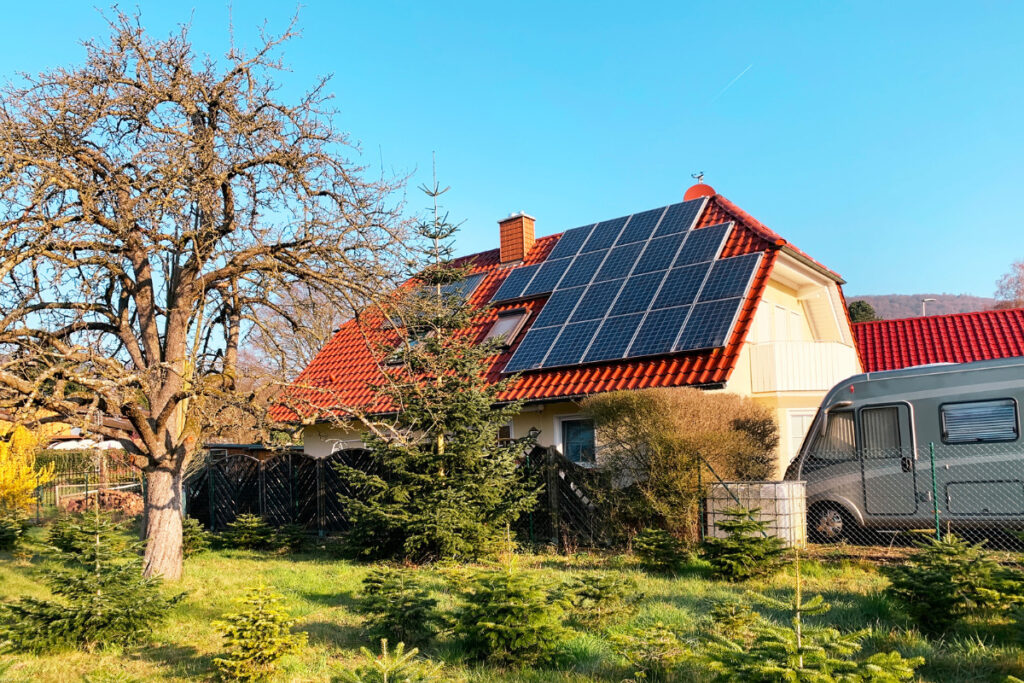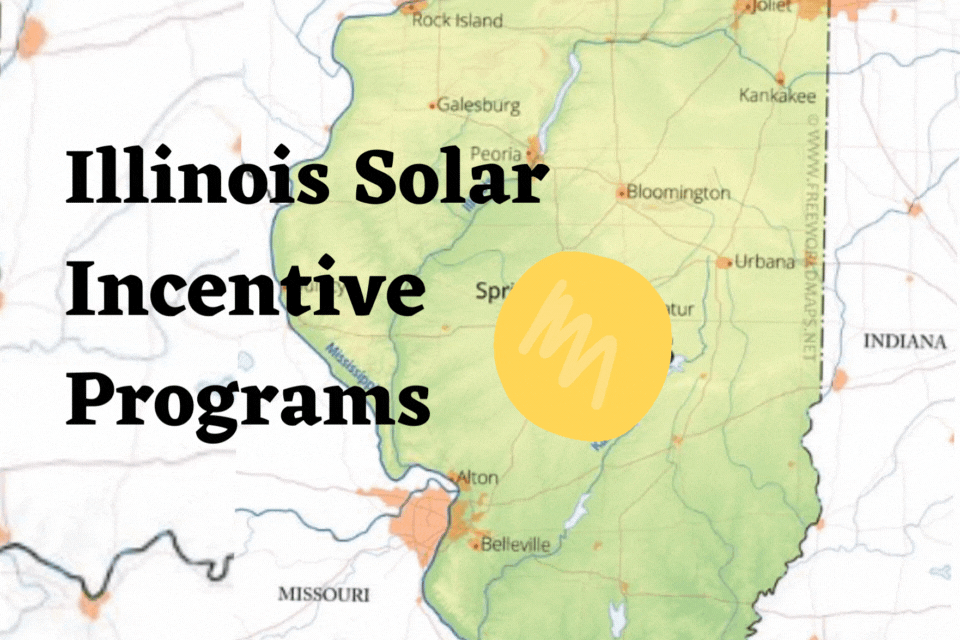Introduction
Welcome to the world of Illinois solar incentives – a powerful tool that can support your transition towards clean and renewable energy while saving you money. Learn about tax breaks, rebates, and grants for Illinois residents seeking to install residential or commercial solar solutions in this blog.
Understanding Illinois Solar Incentives
Illinois provides multiple solar incentives for homeowners. This includes Federal Income Tax Credit, Illinois Solar Tax Breaks, SRECs, and Illinois Solar for All Program.
Federal Income Tax Credit
The Federal Income Tax Credit (FITC) significantly incentivizes Illinois homeowners to install solar panels. It covers the costs associated with purchasing and installing the system. With this tax credit, you can claim a deduction on federal taxes for 30% of qualified expenditures on residential solar energy systems.
The FITC presents an excellent opportunity for homeowners looking to reduce their carbon footprint while saving money on electricity bills. Remember that this incentive has no cap and allows for carrying any remaining portion not deductible within one taxable year into future years until it’s used up.
Illinois Solar Tax Breaks
Illinois provides solar tax breaks for homeowners installing solar panels. These incentives complement federal tax credits. They reduce overall installation costs, making it an accessible option for renewable energy.
Net metering is available for homeowners to earn credit for excess solar energy. Credits can be applied to future electricity bills.

Solar Renewable Energy Credits (SRECs)
In addition to tax credits and rebates, Illinois homeowners can also benefit from Solar Renewable Energy Credits (SRECs). SRECs are a market-based incentive allowing solar owners to sell their system’s renewable energy credits.
When solar panels generate a megawatt-hour of electricity, homeowners earn SRECs. SRECs can be sold on the open market. Their price fluctuates, but they can help homeowners offset installation costs or earn additional revenue. Homeowners who participate in Solar for All benefit from state-level programs.
Illinois Solar For All Program
Illinois Solar for All provides solar panels to low-income households. It’s funded by the state and utility. Eligible homeowners access panels with no upfront costs, transitioning into sustainable energy use.
To qualify for the Illinois Solar for All Program, income guidelines need to be met. Once accepted into the program, participants will receive free installation and ongoing maintenance and monitoring services.
Join this sustainability movement and simplify renewable energy adoption by participating in the Illinois Solar for All program. Empower communities with residential solar panels.
Net Metering
Net metering credits homeowners for excess solar energy. Homeowners receive credits for the excess energy on their accounts. If panels produce more than needed, the extra energy goes back to the grid.
The credits can then be used when you need more electricity, such as on cloudy days or at night. Net metering reduces your dependency on utility companies and helps save money on electricity bills.
Eligibility And Requirements For Illinois Solar Incentives
Homeowners must fulfill certain requirements to be eligible for Illinois solar incentives, including installation by a certified contractor, using approved equipment, and meeting specific energy production thresholds.
Property Owners
Property owners must meet certain requirements to be eligible for solar incentives in Illinois. Firstly, the property must be owned and occupied by the homeowner or a qualified entity, such as a non-profit organization or public facility.
To qualify for incentives, solar panels must meet installation requirements. To apply for solar incentives in Illinois, homeowners can work with approved solar companies who will assist with the application process. There are also online resources to help find local tax exemptions and rebates or calculate estimated savings from installing solar panels.
Installation Requirements
To be eligible for Illinois solar incentives, homeowners must meet certain installation requirements. These include:
- A licensed and certified professional must install the solar panels.
- The system must meet all state and local building codes and regulations.
- The system must be interconnected with the utility grid for net metering.
- The system must have a minimum output capacity of 1 kilowatt (kW).
- The panels must be placed in a location with maximum exposure to sunlight.
Meeting these installation requirements will ensure that your solar system is safe, efficient, and eligible for all available incentives and tax credits in Illinois. So work with a reputable installer who can guide you through the process and help you take advantage of all available benefits.

Timeline For Claiming Incentives
It is important to know the timeline for claiming incentives when considering installing solar panels in Illinois. Typically, homeowners have up to one year after installation to claim their federal tax credit.
However, it is recommended to claim the credit as soon as possible since processing can take several months. Additionally, some utility companies and state programs may have specific deadlines or limited funding available for solar incentives.
For example, the Illinois Solar for All program has an annual budget and accepts applications on a rolling basis until funds are exhausted.
Applying For Incentives
To apply for Illinois solar incentives, follow these steps:
- Check your eligibility: Before applying for incentives, meet all the eligibility requirements. You must be a property owner and adhere to specific installation requirements.
- Research available programs: Find out which incentives are available in your area. Research local tax exemptions and rebates, and check with your utility provider for public programs.
- Use online calculators: Use online solar incentive calculators to estimate the cost of installing solar panels and to determine the potential savings from solar energy.
- Choose an approved installer: Make sure to choose an approved solar panel installer to qualify for incentives that require professional installation.
- Submit applications: Once you’ve researched available programs and found an approved installer, you can begin submitting applications for public incentives.
Illinois homeowners can access incentives and support for sustainability and the local economy through these steps. Clean energy jobs are supported. The 2023 Illinois Solar Incentives Guide provides information on tax credits and rebates. It’s a valuable resource for solar panel installation.
Finding The Best Solar Incentives In Illinois
Discovering the best solar incentives in Illinois is as easy as researching local tax exemptions and rebates, using online solar incentive calculators, or checking with your utility provider for available programs – read on to learn how you can take advantage of these savings.
Researching Local Tax Exemptions And Rebates
If you’re a homeowner considering solar panel installation in Illinois, researching local tax exemptions and rebates can help you save money. Here are some steps to take:
- Check your city or county government websites for information on solar incentives available in your area.
- Look for information on property tax abatements, which can lower the value of your property and reduce your taxes.
- Check with local nonprofits or community organizations that may offer grants or financing options for solar installations.
- Research state-level incentives such as the Illinois Solar Renewable Energy Credits (SRECs) program, which pays homeowners for each megawatt-hour (MWh) of power their system generates.
- Consider joining a community solar program if you cannot install solar panels on your roof.
By taking advantage of these local incentives and tax breaks, you can significantly reduce the upfront cost of installing a solar energy system in your home. This helps you save money, encourages renewable energy use, and supports sustainable living practices in Illinois.
Using Online Solar Incentive Calculators
Determining the cost-effectiveness of installing solar panels without proper analysis can be challenging. Luckily, online solar incentive calculators are available that simplify the process.
Tools estimate potential energy bill savings by considering location, utility rates, and available incentives. They calculate the cost and benefits of installing solar panels. These tools provide helpful estimates.
Checking With Your Utility Provider For Available Programs
It’s always a good idea to check with your utility provider for available programs when exploring solar incentives in Illinois. Many local energy companies offer their own rebate and incentive programs, so it’s worth taking the time to see what options are available to you.
For example, Ameren Illinois offers customers a program that provides bill credits for excess electricity generated by solar panels. This can help offset the installation cost and make going green even more affordable.

Benefits Of Taking Advantage Of Illinois Solar Incentives
By taking advantage of the various solar incentives available in Illinois, homeowners can save money on electricity bills, increase property value, support the local economy, and positively impact the environment.
Cost Savings On Electricity Bills
One of the biggest benefits of taking advantage of Illinois’ solar incentives is the significant cost savings on electricity bills. By installing solar panels, homeowners can generate electricity and reduce dependence on traditional energy sources.
This means lower monthly utility bills and more money in their pockets. In fact, Illinois residents who install a 6 kW solar system could save over $22,000 in electricity costs over 25 years. Utility providers compensate or credit for excess energy sold back to the grid through net metering.
Environmental Benefits
Installing solar panels can have a significant impact on the environment. By switching to solar energy, homeowners reduce their reliance on fossil fuels and greenhouse gas emissions associated with traditional energy sources.
According to the Environmental Protection Agency (EPA), electricity production accounts for roughly 28% of total greenhouse gas emissions in the United States.
In addition to reducing carbon footprints, solar panels require minimal water usage compared to traditional power plants that consume billions of gallons yearly.
Solar panels also decrease the amount of waste produced since they do not generate any harmful pollutants or release toxic chemicals into the air or soil when generating electricity.
Increased Property Value
One of the major benefits of taking advantage of Illinois solar incentives is an increase in property value. According to studies, homes with solar panels installed sell faster and for more money than homes without them.
In fact, some studies show that homes equipped with solar panels can have up to 20% higher resale values than those without.
Additionally, installing solar panels sends a positive message about your commitment to sustainability and environmental responsibility. Increasingly, buyers are looking for energy-efficient homes and are willing to pay extra for them.

Supporting The Local Economy
Investing in solar energy benefits your household and the local economy. By installing solar panels, you can support Illinois’s growing clean energy job market.
According to a 2021 report by Clean Energy Trust, there are over 123,000 clean energy jobs in Illinois, with solar jobs being one of the fastest-growing sectors.
In addition to supporting the growth of green jobs in Illinois, switching to solar power has positive economic impacts on your community. Solar installations can increase property values and stimulate local economies through increased property tax revenues.
Furthermore, some utility companies offer incentives for purchasing locally-produced solar panels or enrolling in community solar programs that benefit residents who may need access to their own rooftop systems.
Conclusion
In conclusion, installing solar panels in Illinois is a wise investment that helps you save money on your electricity bills and contributes to the environment and local economy.
With various solar incentives available, including federal income tax credits, state tax breaks, SRECs, net metering, and the Illinois Solar for All program for low-income households, there has never been a better time to go solar.
Make sure you research before applying for any incentives and take advantage of online tools such as incentive calculators to estimate the cost of installing solar panels on your property.
FAQs
- What are the current incentives for installing solar panels in Illinois?
Illinois offers a variety of financial incentives to encourage the adoption of solar energy, including state and federal tax credits, rebates, and net metering programs. These incentives can significantly reduce the upfront installation cost and help homeowners save on their annual energy bills.
- How do I qualify for Illinois’ solar incentive programs?
The qualifications for Illinois’ solar incentive programs vary depending on the specific program you’re interested in applying for. Generally, homeowners must have a qualifying residential property with enough roof space to accommodate a photovoltaic (PV) array. They must work with an eligible contractor certified to install solar panels in compliance with local codes.
- Can I participate in both state and federal incentive programs at the same time?
Yes! Homeowners can use attracting better offers from buyers because they offer long-term savings on utility costs and multiple incentive opportunities by combining various state and federal programs. For example, residents may be able to apply both State Solar Renewable Energy Credits (SREC) or Adjustable Block Program rebates with Federal Investment Tax Credit (ITC).
- Will my property value increase if I install solar panels due to these incentives?
Homes with rooftop PV systems sell faster and at better prices. They provide long-term savings and reduce carbon footprint. Renewable energy sources like wind and sun carry fewer environmental risks and do not harm resale value.

